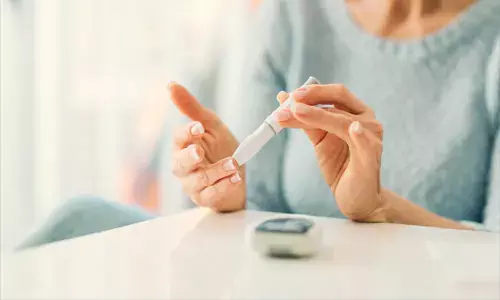- Home
- Medical news & Guidelines
- Anesthesiology
- Cardiology and CTVS
- Critical Care
- Dentistry
- Dermatology
- Diabetes and Endocrinology
- ENT
- Gastroenterology
- Medicine
- Nephrology
- Neurology
- Obstretics-Gynaecology
- Oncology
- Ophthalmology
- Orthopaedics
- Pediatrics-Neonatology
- Psychiatry
- Pulmonology
- Radiology
- Surgery
- Urology
- Laboratory Medicine
- Diet
- Nursing
- Paramedical
- Physiotherapy
- Health news
- Fact Check
- Bone Health Fact Check
- Brain Health Fact Check
- Cancer Related Fact Check
- Child Care Fact Check
- Dental and oral health fact check
- Diabetes and metabolic health fact check
- Diet and Nutrition Fact Check
- Eye and ENT Care Fact Check
- Fitness fact check
- Gut health fact check
- Heart health fact check
- Kidney health fact check
- Medical education fact check
- Men's health fact check
- Respiratory fact check
- Skin and hair care fact check
- Vaccine and Immunization fact check
- Women's health fact check
- AYUSH
- State News
- Andaman and Nicobar Islands
- Andhra Pradesh
- Arunachal Pradesh
- Assam
- Bihar
- Chandigarh
- Chattisgarh
- Dadra and Nagar Haveli
- Daman and Diu
- Delhi
- Goa
- Gujarat
- Haryana
- Himachal Pradesh
- Jammu & Kashmir
- Jharkhand
- Karnataka
- Kerala
- Ladakh
- Lakshadweep
- Madhya Pradesh
- Maharashtra
- Manipur
- Meghalaya
- Mizoram
- Nagaland
- Odisha
- Puducherry
- Punjab
- Rajasthan
- Sikkim
- Tamil Nadu
- Telangana
- Tripura
- Uttar Pradesh
- Uttrakhand
- West Bengal
- Medical Education
- Industry
Berberine and probiotics combo improves postprandial lipidemia and CVD risk in diabetics: Study

China: In a new study conducted by Shujie Wang and team, it was found that Berberine (BBR) and Probiotics (Prob) may have a synergistic hypolipidemic impact on postprandial lipidemia (PL), serving as a gut lipid sink to help type 2 diabetes (T2D) patients reduce their lipidemia and CVD risk.
The findings of this study were published in the journal Gut Microbes.
Non-fasting lipidemia (nFL), which is mostly caused by PL, has recently been identified as a significant CVD risk, comparable to fasting lipidemia (FL). Although effective medicines targeting PL are rare, PL is a prevalent characteristic of dyslipidemia in T2D. The goal of this study was to see if a therapy combining Prob and BBR, a validated antidiabetic and hypolipidemic regimen that works by changing the gut microbiota, could successfully reduce PL in T2D patients and to investigate the mechanism behind it.
In this random, placebo-controlled, multicenter clinical trial, Probiotics and BBR on the Efficacy and Change of Gut Microbiota in Patients with Newly Diagnosed Type 2 Diabetes examined blood PL (120 minutes after eating a 100 g standard carbohydrate meal) in 365 participants with T2D from the Probiotics and BBR on the Efficacy and Change of Gut Microbiota in Patients with Newly Diagnosed Type 2 Diabetes (PREMOTE study).
The key findings of this study are as follow:
1. After 3 months of follow-up, Prob+BBR outperformed BBR or Prob alone in terms of reducing postprandial total cholesterol (pTC) and low-density lipoprotein cholesterol (pLDLc) levels, as well as lowering various species of postprandial lipidomic metabolites.
2. The changes in fecal Bifidobacterium breve levels in response to BBR alone or Prob+BBR therapy were associated with this effect.
3. BBR transcriptionally activated four fadD genes encoding long-chain acyl-CoA synthetase found in the genome of this B. breve strain.
4. In vitro BBR treatment reduced the concentration of FFA in B. breve growth medium even more than vehicle treatment. To mediate the action of Prob+BBR on PL, activation of fadD by BBR might increase FFA import and mobilization in B. breve while diluting intraluminal lipids for absorption.
In conclusion, this clinical trial-based study demonstrated the therapeutic effect of a combined treatment of oral administration of berberine with probiotics on improving V in newly diagnosed T2D patients and proposed a new gut microbiome-related remedy for managing dyslipidemia in T2D patients, covering both PL and FL.
Reference:
Wang S, Ren H, Zhong H, Zhao X, Li C, Ma J, Gu X, Xue Y, Huang S, Yang J, Chen L, Chen G, Qu S, Liang J, Qin L, Huang Q, Peng Y, Li Q, Wang X, Zou Y, Shi Z, Li X, Li T, Yang H, Lai S, Xu G, Li J, Zhang Y, Gu Y, Wang W. Combined berberine and probiotic treatment as an effective regimen for improving postprandial hyperlipidemia in type 2 diabetes patients: a double blinded placebo controlled randomized study. Gut Microbes. 2022 Jan-Dec;14(1):2003176. doi:10.1080/19490976.2021.2003176.
Medical Dialogues consists of a team of passionate medical/scientific writers, led by doctors and healthcare researchers. Our team efforts to bring you updated and timely news about the important happenings of the medical and healthcare sector. Our editorial team can be reached at editorial@medicaldialogues.in.
Dr Kamal Kant Kohli-MBBS, DTCD- a chest specialist with more than 30 years of practice and a flair for writing clinical articles, Dr Kamal Kant Kohli joined Medical Dialogues as a Chief Editor of Medical News. Besides writing articles, as an editor, he proofreads and verifies all the medical content published on Medical Dialogues including those coming from journals, studies,medical conferences,guidelines etc. Email: drkohli@medicaldialogues.in. Contact no. 011-43720751


